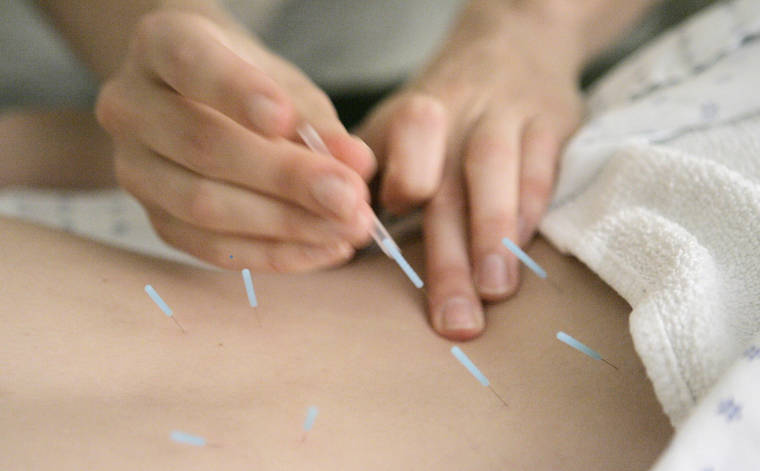Acupuncture: Does it work and is it covered by Medicare?

ASSOCIATED PRESS / 2007
Anah McMahon, L. Ac. adjusts one inch seirin acupuncture needles in the muscles around the spine of Mariah VanHorn to relieve lower back pain at the Pacific College of Oriental Medicine in Chicago.
Dear Savvy Senior: Is acupuncture a viable treatment for pain, and is it covered by Medicare? Since the pandemic hit, I have a lot of lower back and neck pain and am wondering if it’s worth trying. What can you tell me? — Looking for Solutions
Dear Looking: Many studies over the years — funded by the National Institutes of Health — have found acupuncture to be very effective in easing pain and that it can help with a variety of other ailments, too. Here’s what you should know.
Acupuncture treatment
First used in China more than 2,000 years ago, acupuncture has become increasingly popular in the United States over the past decade.
While acupuncture isn’t a cure-all treatment, it is a safe, drug-free option for relieving many different types of pain, including low back pain, neck pain, osteoarthritis, migraine headaches, fibromyalgia, postoperative pain, tennis elbow, carpel tunnel syndrome, dental pain and more. Studies have also shown that it can be helpful in treating asthma, depression, digestive disorders, menopause symptoms like hot flashes, and nausea caused by chemotherapy or anesthesia.
Exactly how or why acupuncture works isn’t fully understood, but it’s based on the traditional Eastern theory that vital energy flows through pathways in the body, and when any of these pathways get blocked, pain and illness result. Acupuncture unblocks the pathways to restore health.
Don't miss out on what's happening!
Stay in touch with breaking news, as it happens, conveniently in your email inbox. It's FREE!
However, today most Western practitioners think acupuncture works because it stimulates the nerves, causing the release of endorphins, which are the body’s natural painkiller hormones. It’s also shown to increase blood circulation, decrease inflammation and stimulate the immune system.
What to expect
During acupuncture, practitioners stimulate specific points on the body by inserting thin needles through the skin. The needles are solid, sterile and disposable (used only once), and as thin as a cat’s whisker.
The number of needles used for each treatment can vary anywhere from a few up to a dozen or more. Where the needles are inserted depends on the condition being treated, but they are typically placed about one-quarter to 1-inch deep and are left in place for about 20 minutes. After placement the needles are sometimes twirled or manipulated, or stimulated with electricity or heat.
You might feel a brief, sharp sensation when the needle is inserted, but generally it’s not painful. Once the needle is in place, however, you might feel a tingling sensation, numbness, mild pressure or warmth.
How many treatments you’ll need will depend on the severity of your condition — 12 treatments done weekly or biweekly is common. It’s also important to know that acupuncture can be used in conjunction with other, conventional medical treatments or by itself.
Cost and coverage
The cost per treatment typically runs anywhere from $40 to $150, depending on where you are in the country and what style of treatment you are receiving.
Today an increasing number of private insurance plans, including some Medicare Advantage plans, and policies provided by employers offer some type of acupuncture coverage.
You’ll also be happy to know that in January 2020 the Centers for Medicare and Medicaid Services announced that original Medicare will now cover up to 12 acupuncture sessions in 90 days for patients with chronic lower back pain. Eight additional sessions can be added if patients show improvement.
But in order to receive Medicare coverage, you must use a licensed acupuncturist who is supervised by a medical doctor, physician assistant or nurse practitioner trained in acupuncture, who will need to process the acupuncture claim. Currently, licensed acupuncturists can’t directly bill Medicare.
To find an acupuncturist in your area, ask your doctor for a referral, or you can do a search online. Two good resources are the National Certification Commission for Acupuncture and Oriental Medicine (nccaom.org) and the American Academy of Medical Acupuncturists (medicalacupuncture.org), which offers a directory of M.D.s and D.O.s who are certified to practice acupuncture.
Jim Miller is a contributor to NBC-TV’s “Today” program and author of “The Savvy Senior.” Send your questions to Savvy Senior, P.O. Box 5443, Norman, OK 73070; or visit savvysenior.org Opens in a new tab.



